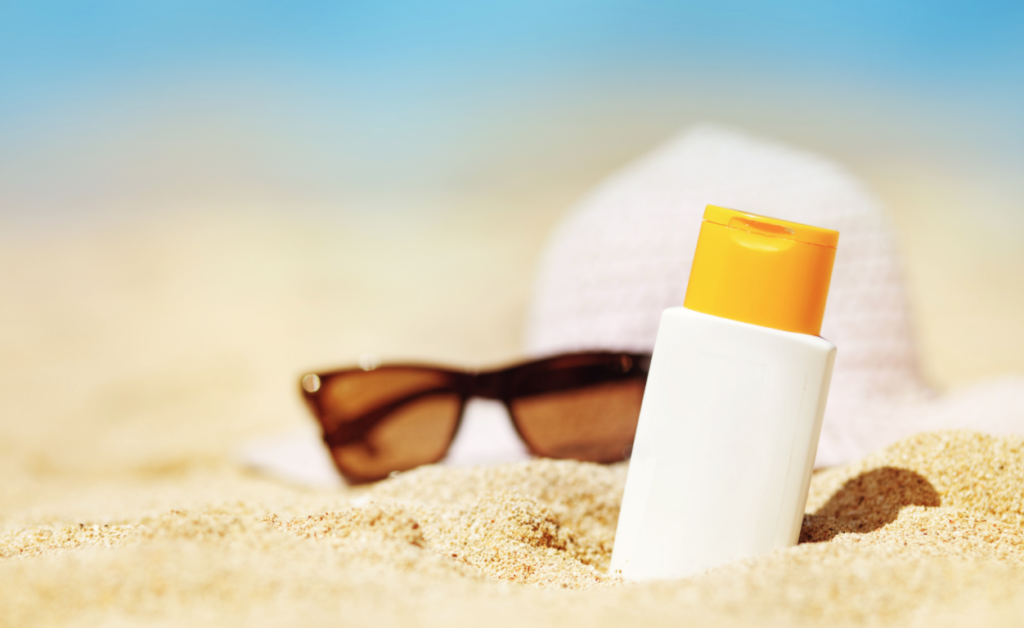
Sunscreen is critical for maintaining youthful, healthy skin.
Protecting your skin from the sun is essential, and not just to avoid sunburn. Damage to skin from sunlight can cause skin cancer, and it’s the primary cause of aging-related wrinkles.
These should be enough reasons to add sunscreen to your daily regime if you live in sunny areas.
Which sunscreen should you use?
The number of sunscreen options are overwhelming, so our researchers have combed through them to come up with the ten best sunscreens you can use to protect your skin from damaging sunlight.
1. Badger Broad Spectrum
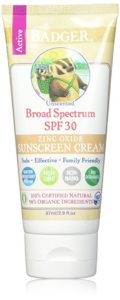
Click here for the lowest price on Amazon
Badger Broad Spectrum is a strong, thick, purely zinc oxide based sunscreen. It has no synthetic ingredients; the zinc oxide is carried purely in natural oils and extracts like beeswax and sunflower seed oil.
This is sure to make it a favorite among people looking to avoid artificial ingredients wherever possible, as well as with parents of small children.
The only downside is that the high zinc oxide content will definitely leave a whitish sheen on your face. That’s the price to pay for an all-natural sunscreen, though.
2. Babyganics Mineral-based Sunscreen
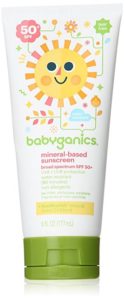
Click here for the lowest price on Amazon
When choosing a sunscreen for children and infants you want to be especially vigilant for chemical additives that aren’t necessary, since children and infants are much more sensitive to toxic compounds if they are exposed.
Babyganics uses octisalate, titanium dioxide, and zinc oxide to block UV radiation instead of the oxybenzone used in standard sunscreens. It also replaces many of the standard petroleum-based oils and compounds with plant seed derived oils, like jojoba seed oil and coconut oil.
These choices make it a winner for parents and for anyone who wants their sunscreen to be as natural as possible.
3. Blue Lizard Australian Sunscreen
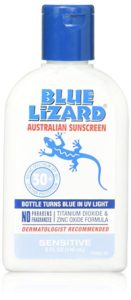
Click here for the lowest price on Amazon
This sunscreen is great if you have sensitive skin or if you hate fragrances. It’s very simple and straightforward; it uses the mineral agents zinc oxide and titanium dioxide to block the harmful ultraviolet radiation from the sun, and it has no perfumes or fragrances added.
It isn’t the strongest candidate when it comes to water resistance, but if you are just spending the day outside, it’s a great option.
4. CeraVe AM Moisturizing Facial Lotion
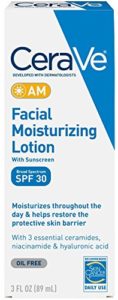
Click here for the lowest price on Amazon
CeraVe,well known for its moisturizing products, branches out into sunscreen in fine form with their AM moisturizing lotion. As you’d expect with a Cerave product, this product is a moisturizer first, and a sunscreen second.
It isn’t a top pick for its sun blocking compounds, which are a combination of zinc oxide and salates, but its ability to moisturize while also protecting from the sun.
Users love the long-lasting hydrating effects of its blend of ceramides, so if you need a moisturizer that also has sun protection, this should be your choice.
5. Alba Botanica Very Emollient Sunscreen
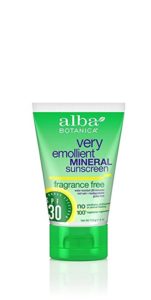
Click here for the lowest price on Amazon
Alba Botanica makes a sunscreen that’s something of a cross between a moisturizer, a soothing salve, and a sunscreen. It uses the healing properties of aloe vera, plus the moisturizing effects of shea butter oil and jojoba seed oil in combination with UV-blocking compounds to achieve a water-resistant, long-lasting sun blocking effect.
Alba Botanica would be an excellent choice for an everyday skin moisturizer during the sunny season, when you want to protect your skin from the everyday sun damage that adds up over time, leading to premature skin aging.
6. Australian Gold Botanical Sunscreen
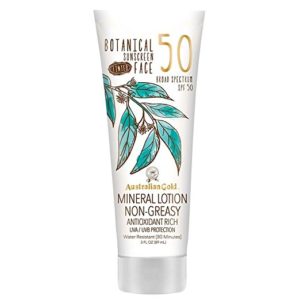
Click here for the lowest price on Amazon
Australian Gold is an herbal and mineral-based sunscreen that uses titanium dioxide and zinc oxide as its sun blocking ingredients. It mixes these with a blend of natural plant seed oils and herbal extracts for a product that’s free of oxybenzone, parabens, and other undesirable chemical additives.
It is naturally scented, so if you are especially sensitive to aromas, it may not be the right choice for you. Australian Gold isn’t all-natural; it still has some synthetic chemicals as part of the formulation to give it the right consistency, but despite this, it’s still a pretty solid choice.
7. Vanicream Sunscreen
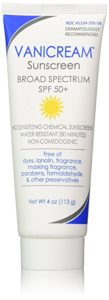
Click here for the lowest price on Amazon
Vanicream distinguishes itself by being very focused on providing sunscreen without any scents, fragrances, or compounds that could aggravate sensitive skin.
It achieves its sun blocking effects with just zinc oxide and titanium dioxide, and the formulation takes several precautions to avoid including any potential allergens.
It doesn’t have any particularly attractive moisturizers or skin healing agents, but if you have sensitive skin, it’s a safe, solid bet for a reliable sunscreen.
8. Neutrogena Clear Face Liquid Lotion Sunscreen
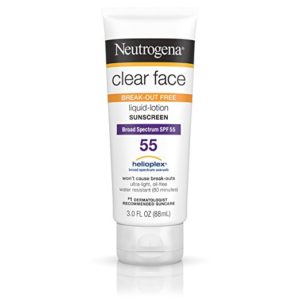
Click here for the lowest price on Amazon
One of the problems with many sunscreen lotions is that they are fairly thick and have a tendency to clog up your sweat pores if you don’t wash them off.
Neutrogena attempts to solve this problem with a thin, liquid-based sunscreen made for people with a tendency to break out in pimples or cysts when their skin pores get clogged.
It accomplishes this goal, but to do so, it uses sun blocking compounds like oxybenzone, which have some safety concerns surrounding them. While it might be a potential option if other sunscreens give you breakouts, the high content of petroleum based compounds and the oxybenzone prevents it from becoming a top pick.
9. Maui Sun Sunscreen
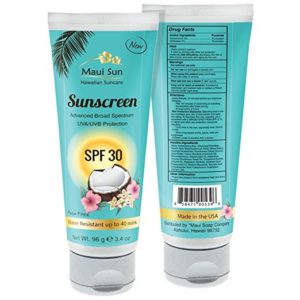
Click here for the lowest price on Amazon
Maui Sun makes a pretty basic sunscreen that is water resistant and has several natural ingredients that are nice to see, like cocoa butter, shea butter, and coconut oil.
It avoids oxybenzone, but only does so by the substitution of a chemically similar compound, avobenzone. This might be oxybenzone free in principle, but whether the closely related chemical cousin is any better is definitely up for debate. This prevents it from moving any higher in the rankings.
10. Beyond Coastal Active Sunscreen
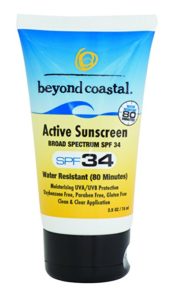
Click here for the lowest price on Amazon
Beyond Coastal Active Sunscreen is another product that does some chemical sleight of hand to advertise itself as oxybenzone-free but accomplishes this by using avobenzone instead.
It tosses in a few antioxidants like vitamin B5 and green tea extract, but it’s hard to tell whether this would have any real effect, since its overall skin healing properties are subpar.
One thing it does have going for it is that it is highly water resistant, so if you don’t mind the avobenzone, it’s very resistant to sweat and ocean water and thus works well for very active people.
Sunscreen benefits and side effects
Protecting your skin from sunlight with a sunscreen isn’t just for stopping sunburn. Skin damage from sunlight is also the primary cause of skin aging, further, it’s the primary cause of skin cancer.
There is good evidence that the right sunscreen can help avoid all three of these negative effects.
Benefits
The obvious benefit of sunscreen is that it helps you avoid sunburn, which is painful and irritating. But perhaps more important is its ability to protect your skin against aging and help you reduce your risk of skin cancer.
On the aging front, there is good evidence that one of the main causes of skin aging is accumulated damage from exposure to the sun. Thats why many sunscreens are blasted with free radical fighters like green tea extract, aloe vera and coconut oil.
According to a scientific paper published in the Journal of Investigative Dermatology, exposure to sunlight damages several aspects of skin, especially the elastic connective tissue (1).
These compounds are what gives skin its stretchiness and suppleness, and exposure to excessive sunlight causes degradation and staining. This, in part, is what causes the discolored spots that characterize aged skin.
A direct, randomized clinical control trial in Australia demonstrated the effects of sunscreen use on skin aging. A study published in the Annals of Internal Medicine describes the experiment: over 900 healthy adults in Australia were assigned to either daily use of sunscreen or “discretionary” use of sunscreen (meaning the subjects decided when to use sunscreen based on their daily activities).
After 4.5 years, the researchers found that the group that had been assigned to use sunscreen on a daily basis had significantly less skin aging when compared to those who had used sunscreen at their own discretion (2). This makes a strong case for applying a daily moisturizer to protect your skin and prolong its health.
Research also indicates that there is a strong connection between tendency to use sunscreen and avoidance of certain types of skin cancer. A study published in the journal Cancer Epidemiology, Biomarkers, and Prevention found that regular use of sunscreen reduced the risk of squamous cell carcinoma, a type of skin cancer, by almost 50% (3).
Other research found that regular sunscreen use during childhood could potentially reduce the risk of squamous cell and basal cell carcinoma by up to 80% (4). Both studies concluded that by reducing the amount of ultraviolet light that reached the skin cells, sunscreen reduces the damage to your skin’s DNA, which in turn reduces the risk for skin cancer.
Side Effects
Sunscreen is widely used, so there are few, if any, common side effects. However, there is mounting concern over one particular ingredient in many popular sunscreens called oxybenzone.
Oxybenzone is a synthetic compound that blocks ultraviolet radiation and is also very translucent, making it an attractive ingredient for sunscreen, but several scientific studies have highlighted its potential to disrupt the endocrine system by mimicking hormones in your body.
A paper published in 2017 in the journal Cosmetic Dermatology by Joseph C. DiNardo and Craig A. Downs discusses the potential problems with oxybenzone (5).
According to the authors, the chemical has been linked to disruptions of the hormonal system in lab animals, as well as contact dermatitis in humans–basically, breaking out in a rash once the sunscreen has been applied.
More troubling is the finding that a large proportion of the applied dose of a sunscreen is absorbed through your skin, metabolized, and passed out of your body in your urine. This was the conclusion of a study published in 2004 by researchers at the University of Manitoba in Canada (6).
They found that up to one percent of the total amount of oxybenzone applied to the skin (in the form of a standard sunscreen) is metabolized and excreted through urine, as judged from analytical chemistry analysis of the urine of human subjects who had a standardized amount of sunscreen applied to their skin.
Because of the potential negative side effects–even though they are still speculative and not proven–it’s probably better to avoid oxybenzone, especially in a daily-use sunscreen.
Recommended Usage
A standard moisturizers with sunscreen included will last you a good part of the day, assuming you are not exercising, swimming, or otherwise exposing yourself to water that could wash away the sunscreen.
If you will, you should apply a water-resistant sunscreen, and re-apply it every hour or so while you are in the sun. According to the American Academy of Dermatology, you should apply sunscreen 15 minutes before going outside, since it takes a while for your skin to absorb sunscreen (7).
Recap
When properly selected, the right sunscreen can protect your skin from premature aging, sunburn, and even skin cancer. Different types of sunscreen are appropriate in different settings, but in general, most people will want some type of daily moisturizing lotion that incorporates sunscreen alongside moisturizers that keep your skin healthy.
For long days out in the sun, especially if you will be sweating a lot or going in the water, you will also want a sunscreen that is water-resistant. Though the scientific research is not conclusive, it’s probably best to avoid sunscreens that use oxybenzone to block the sun’s rays, because of potential safety concerns.
Instead, opt for a sunscreen that uses zinc oxidate or titanium dioxide, since these are known to be safe on your skin. They do tend to leave a whitish film over your skin, but that’s much better than worrying about what a compound like oxybenzone could be doing to your hormonal balance.
Regular use of sunscreen can help you prevent sunburn, halt skin aging, and even reduce your risk of skin cancer, so whether you should get yourself sunscreen is an easy decision.
https://bodynutritionorg.wordpress.com/2018/02/06/ranking-the-best-sunscreen-of-2018/
No comments:
Post a Comment